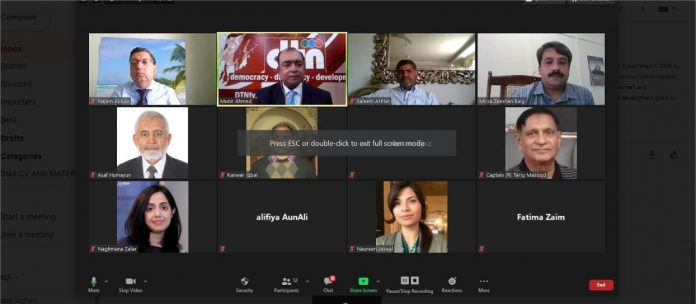ISLAMABAD, JULY 14 (DNA) – Experts and civil society representatives have shown their grave concerns over least prioritizing the Sustainable Development Goal (SDG) 14 – Life Below Water that deals with the maritime affairs.
They urged the government to take immediate steps to tackle marine pollution, streamline its management in a more sustainable manner by amicably resolving the overlapping mandate of the federal and provincial authorities.
The participants also showed their trepidations and apprehensions for the extremely overlooked revised draft of the National Maritime Policy (NMP) that is lost in the government shelves for over three years.
They also suggested establishing a joint policy advocacy, awareness-raising and outreach platform for the maritime stakeholders especially on the SDG14 targets.
They were speaking at a multi-stakeholder consultative webinar organized by the Development Communications Network (Devcom-Pakistan) and DTNTV on Tuesday. Well-known environmentalist and Devcom-Pakistan and DTNTV Director Munir Ahmed hosted and conducted the webinar.
Speaking on the occasion, Admiral (Retired) Asaf Humayun said that Pakistan was signatory to many international treaties and conventions on maritime affairs but we hardly had any significant implementation.
Maritime affairs hava also divided mandates between the federal and the provinces after the 18th amendment in the constitution.
On many occasions, he said, it turned to be quite confusing what role is of the federal and what role should be picked up by the provinces. Being far away from the Centre despite having the federal ministry, often the maritime affairs have no fanfare and sometimes we see duplication of work. The International Maritime Organization (IMO) has all types of globally accepted regulatory frameworks, Pakistan simply adopts it for the sake of marine resource conservation.
Rear Admiral (Retd) SaleemAkhtar said we have three ports and a very long coastal belt to benefit from the blessings of the ocean but have no adequate policy and action plan to harness the benefits. More than 3000 million gallons of untreated wastewater is drained to the ocean. It has caused severe sea pollution damaging the fisheries. European Union has banned import of fish from Pakistan resulting one-sixth of the catch goes to the poultry feed and part of it consumed locally.
He said we need to take immediate steps to stop plastic pollution and flow of untreated liquid waste to the sea. We have defined parameters to check the oil pollution from the visiting ships and those we break in the shipyard. But SOP are hardly implemented in letter and spirit.
SDG 14: Life Below Water – Introduction and importance for Pakistan
Mirza Zeeshan Baig, Director General Maritime Affairs, Ministry of Planning, Development and Special Initiatives, said the Federal SDG Unit in the Planning Commission is effectively coordinating progress with the partners and stakeholders. All tiers of government need to establish horizontal and vertical partnerships for coordinated efforts to achieve meaningful progress on SDGs. To achieve success on SDGs agenda a strong partnership between public and private sector and civil society is needed.
He also urged the partners and stakeholders to develop a platform for the SDG 14 to develop an integrated approach to combat the maritime challenges.
Talking about the best practices to tackle marine pollution, the UK-based Pakistani research scholar and Senior Research Fellow Central and South Asia at the East-West Institute Dr Najam Abbas said: Different countries and international forums have devised mechanisms to control marine pollution. SOP defined are religiously followed by the watchdogs. Many countries have taken strict steps to stop untreated water and they have found ways to stop the plastics flowing to the sea.
Highlighting the policy gaps, Karachi-based Staff Officer Research with the National Centre for Maritime Policy Research (NCMPR), Naghmana Zafar said: Maritime affairs are the least priority for the government from policy to action. After 18th amendment, most part of maritime was handed over to provinces without building up their capacity to handle it. Some functions were kept with the Centre. Lack of efficient policies and action agenda, the deep waters are left to the mercy of neglect. The new National Maritime Policy is long awaited but the government is busy elsewhere that shows lack of political commitment.
Khalid Taimur Akram, Executive Director of the Centre for Global and Strategic Studies (CGSS), said the adverse impacts of Climate Change has been witnessed over the world’s Oceans. They are heating up and causing the worst impact on aquatic life as many species have vanished, fishes are dying while the oceanic system is getting bleak that would not only result in wiping off more species but causing disasters too.
Kanwar Javed Iqbal, Sr Research Fellow with Islamabad-based National Institute of Maritime Affairs (NIMA), said: Pakistan’s maritime agenda, federal government along with provincial governments of Balochistan and Sindh should take necessary steps for the promotion of applied research and its uptake in policies and processes. After the 18th amendment in the national constitution, it’s a shared responsibility for various segments of marine resources.
He said, for the purpose, the Ministry of Maritime Affairs (MoMA) needs to establish a research wing in order to ensure effective policy and planning cycle in collaboration with respective provincial and federal departments such as Environment Protection Departments (EPDs) and EPAs. The Planning Commission of Pakistan should provide an enabling role towards the planning cycle while academic institutions be linked for issue-based MS and PhD research where support may be taken from the Ministry of Science and Technology. DNA
===========

















